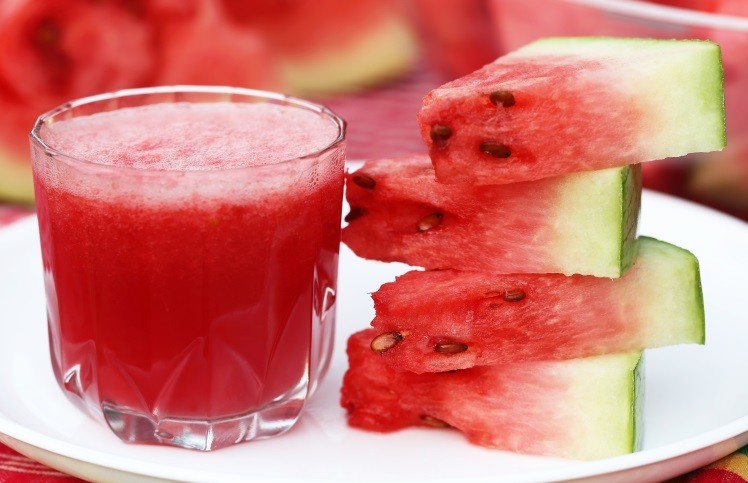Watermelon offers plenty of health-boosting benefits. It’s a red fleshy vine fruit originally from the western region of Africa, but which is now grown all over the world. This yummy member of the melon family can help to curb cravings for sweet foods while delivering plenty of useful nutrition to the body.
Let’s learn a little more about the incredible health benefits watermelon can offer:
Low Calorie
Watermelon is part of a very short list of guilt-free fruits that can be consumed in larger quantities without the worry of excess calories. 2 cups of diced watermelon contains 90 calories, the same amount found in a single small apple. Just don’t go too far overboard, as that same serving size delivers 20g of sugar.
Not bad, but not to be abused.
Lycopene
Lycopene is a carotenoid phytonutrient that’s essential for healthy cellular function and gene expression in the body. It’s most bountiful in fruits and veggies that have a deep red or pink flesh. Pink grapefruits, guava and tomatoes are also rich in lycopene, but each of those are much more calorie and sugar-dense than watermelons.
Tomatoes are perhaps the most popular form of lycopene in the North American diet, and throughout several other areas of the world. One cup of watermelon has up to 80x more lycopene than a single medium tomato!
Lycopene’s an antioxidant responsible for ridding our blood and tissues of dangerous free radicals that cause:
• Aging throughout the body
• Hardening/narrowing of the arteries
• Macular degeneration
• Diabetes
• Infertility
• Osteoporosis
• Hair and skin aging
Carotene
Watermelon contains both a-carotene and b-carotene.
A-carotene is used throughout the body as a powerful antioxidant, nearly as powerful as Vitamin C and lycopene. Very few western diets are deficient in a-carotene.
B-carotene is converted to retinol a form of vitamin A, which is essential for proper maintainance of our eyesight. B-carotene can also be converted to retinoic acid, essential for repairing skin, teeth and bones. One cup of watermelon contains only about 5% RDA of B-carotene, but the good news is that excess is stored in our liver and fat cells for later use. Several studies have shown elderly patients with macular degeneration, cataracts, and poor bone density had low levels of b-carotene in their bodies.
Citrulline
A single cup of diced watermelon offers up 250mg of citrulline. Citrulline is converted into the amino acid arginine by our kidneys. Arginine is responsible for many processes in the body, namely for is vasodilation/vasoconstriction properties which are essential for proper blood flow throughout the circulatory system. Though it’s a non-essential amino (ie., our bodies produce it) many people, particularly men are deficient in argine, causing fertility and erection quality issues.
Insufficient arginine levels are also known to be a factor in the premature narrowing of the arteries due to reduced blood flow, and also causes bone abnormalities and genetic deformities by blocking the tissue-nonspecific alkaline phosphatase enzyme.
Vitamin C

Watermelons aren’t nature’s richest source of vitamin C, at just 16% RDA per cup. However, aside from green leafy vegetables, watermelons offer a substantial dose of C without causing a huge upswing of insulin activity like an apple or citrus fruit would. Vitamin C, or ascorbate is one of the most powerful antioxidants in our body and also an essential nutrient that’s required for collagen production.
Lack of vitamin C in the body causes far-reaching problems related to oxidative stress including heart disease, diabetes, cancer, bone and tooth loss, macular degeneration, and poor skin and hair health.
Water!
The weight of a watermelon is nearly 80% water, meaning you might not need to drink as many glasses of water if you take in a serving or two of watermelon every day.
How to Maximize the Benefits of Your Watermelon
The antioxidant content in watermelons (and all other fruits and veggies for that matter) is at a peak just as the food attains perfect ripeness.
To get the maximum health benefits from watermelon, ensure it’s completely ripe before you eat it. The easiest way to tell is by the shine on the skin. Non-ripe watermelon will have a very dull, hairy feeling rough texture to the outer skin. Once ripe, the skin will take on a waxy, shiny look and feel very smooth, even slippery to the touch.
Don’t be afraid to eat the skin too, if you can handle the slightly bitter taste. The skin contains most of the plant’s insoluble fiber, great for scrubbing the intestines and bowels. Watermelon skin also has significant amounts of vitamin C and lycopene – why toss that nutrition in the trash?




